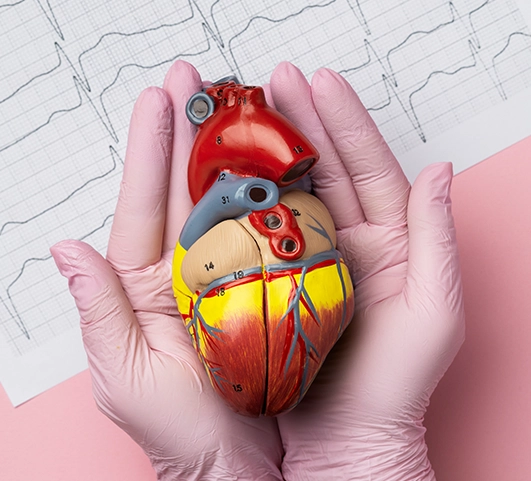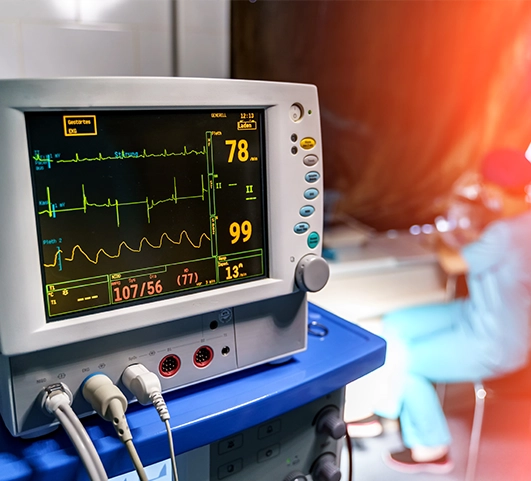


Addressing complex heart rhythm disorders with added precision and expertise.
Artemis Cardiac Centre is committed to your hearts well-being. We bring together a team of India's leading cardiac specialists backed by the most advanced and innovative modalities. Our experts offer procedures like Radio frequency ablation for helping patients with Supra ventricular and Ventricular tachyarrhythmia. Our experts adhere to stringent benchmarks of quality and safety to ensure the best possible care for you and your loved ones.
Our team strictly adheres to personalized treatment plans because we believe that every individual has unique medical requirements. Throughout your journey from treatment to recovery, we ensure your medical needs are being catered to with a robust approach.
ENQUIRE NOW

Radio Frequency Ablation (RFA), also referred to as cardiac ablation, is a medical procedure that uses radiofrequency energy to produce heat and generate current that targets and destroys tissues in specific areas of the heart. This is done to reduce or eliminate abnormal signals that interfere with the normal conductivity of the heart and prevent it from functioning optimally. Radiofrequency ablation is commonly used for managing heart rhythm abnormalities like supraventricular tachyarrhythmia and ventricular tachyarrhythmia.
Radio Frequency Ablation For Supra Ventricularand is broadly classified and based on the technique that is used:
ENQUIRE NOWIt can take around an hour or two
Most patients can go home on the same day while some might need to be admitted depending on overall health
Most patients return to work within 2 to 3 weeks
We have restored hundreds of patients' lives with timely angioplasty at Artemis Cardiac Care . Whether it's an emergency heart attack or a planned procedure, our cardiology team has achieved consistent, high-success rates.
Our individualized care, state-of-the-art facilities, and post-procedure care are valued by our patients. We're honored to be go-to heart care partner, providing both clinical expertise and humane healing.




Distinguished Cardiac Care Expertise
Eminent Cardiac Care Integrated with Advanced Technology
Transformed Lives with Trust and Care .
You may be recommended to go for angioplasty if you are experiencing any of the following symptoms linked to coronary artery disease, which are not responding to medication and lifestyle modifications:

If your heart is beating too fast

If you feel a pounding sensation in your chest

If you tend to get tired too easily and feel general body weakness

Unexplained chest pain that radiates towards the shoulder, arm and neck

If you fall short of breath even after mild physical activities or at rest

If you feel dizzy or lightheaded, without any known reason

If you have started sweating a lot, especially at night

If you fall unconscious or lose consciousness
Various Benefit of Radio Frequency Ablation For Supra Ventricularand are:
Radio Frequency Ablation, is performed under the influence of anesthesia which means that you will not feel any pain or discomfort while the procedure is being carried out, however you are likely to feel pain and soreness for a couple of days following the procedure. This can be managed with the help of the prescribed pain medication.
Radio Frequency Ablation can be used for treating several different types of arrhythmias including Supraventricular and Ventricular Tachyarrhythmia. The former refers to abnormally fast paced heartbeats that arise from above the ventricles, and the latter refers to fast paced heartbeats that originate within the ventricles.
Radio Frequency Ablation may be a curative treatment in some cases, but not always. Despite being highly effective, it may only help in the management of the arrhythmia and not cure them. The success rate of the procedure depends on various factors which include the type of arrhythmia and its severity.
In the majority of the cases, the patients resume normal activities within 2 to 3 weeks following Radio Frequency Ablation. Some people may take longer depending on the severity of the arrhythmia.
Although not always, in some cases, Radio Frequency Ablation needs to be repeated if the problem persists or comes back.
From Recent Advancements in Heart Care to Tips and Tricks to make your Heart Healthy Again, stay updated with reliable and informative blogs by our experts.
View All Blogs

